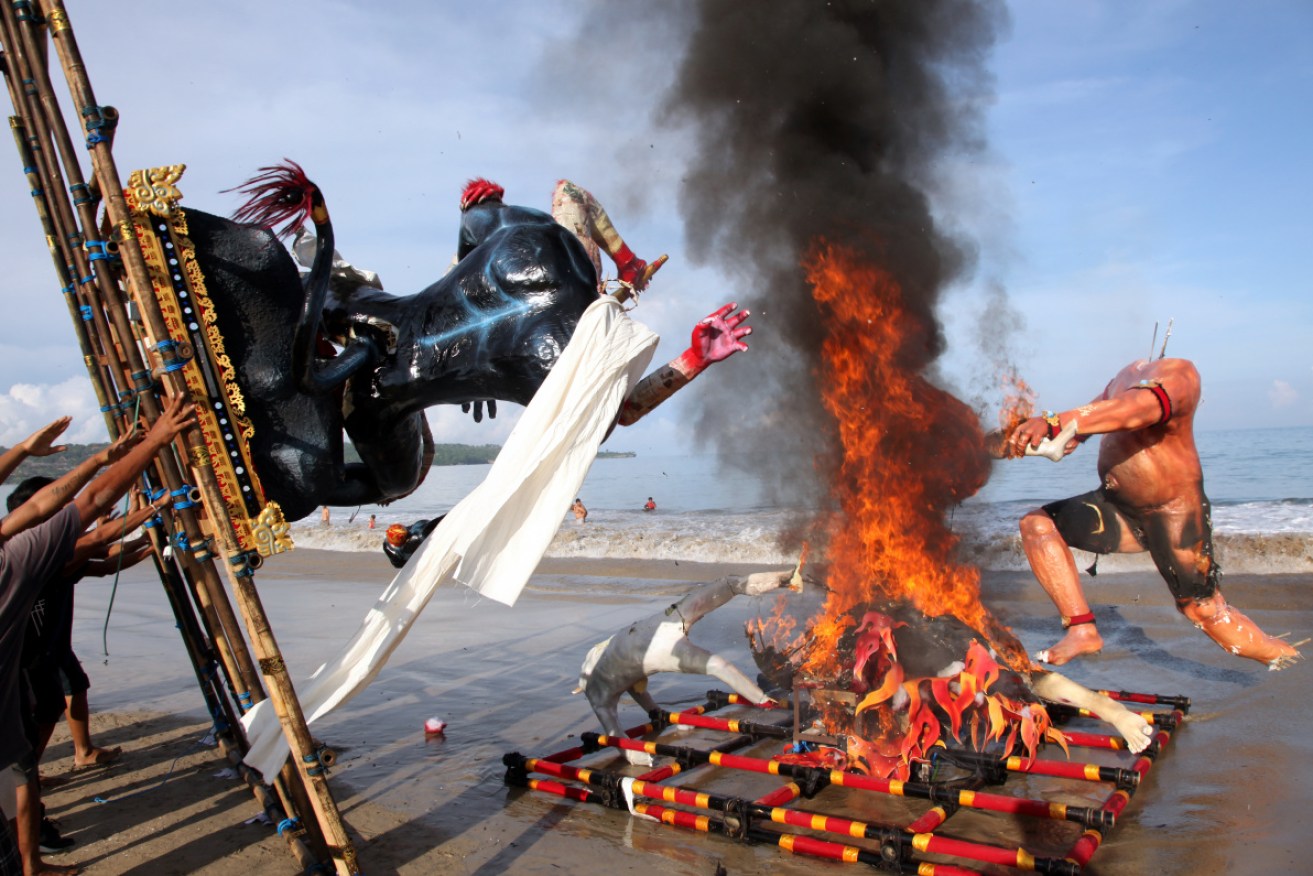Airport closed, tourists shut up in resorts: The day Bali was cut off from the outside world


Symbols of evil spirits known as Ogoh-ogoh are cremated during an event on Nyepi eve in Bali. Photo: Getty
Lights on Indonesia’s busiest holiday island were blacked out on Thursday night, airports were closed and tourists banned from the beach – ordered instead to hole up in resort rooms.
Tens of thousands of security guards patrolled Bali’s abandoned streets, pouncing on anyone speaking too loudly or appearing too animated in their homes.
Surfers looking to capitalise on rare empty waves were warned to think twice.
Laughing, playing music, using a mobile phone or even switching on a too-bright light could be attract the wrath of traditional guards known as the Pecalang.
Australians notorious in Kuta for their party antics were forced into uncharacteristic sobriety, and anyone dreaming of cocktails by the pool was quickly brought back to reality by the obvious absence of hotel staff.

Pecalang patrol abandoned streets in Bali during Nyepi. Photo: Getty
It may sound like the holiday from hell for some travellers, while others could be charmed by the novelty of experiencing a usually lively island, suddenly deserted.
But for the Balinese it was a solemn time – the one day the population could take a breath to recharge after the frenzy of five million tourist visits in the past year.
Mobile phone companies even agreed to switch off their services to ensure no one was distracted in their day of rest.
Known as the ‘day of silence’, Nyepi is a Hindu celebration with restrictions on activities, noise and eating observed for 24 hours. It was due to finish at 6am on Friday, when the Balinese would then begin New Year’s Day celebrations.
Hindus of #Bali (#Indonesia) are celebrating their #NewYear today. It's called #Nyepi, the day of silence. While Western & westernized world pompously celebrates the new year, Balinese #Hinduism welcomes it in noble silence. It is a day reserved for self-reflection.#KnowOurFests pic.twitter.com/JuBzoJYFu6
— Gampa Sai Datta (@GampaSD) March 7, 2019
The New Daily spoke to tourists who were apprehensive about the day especially the prospect of 24 hours without internet or phone – something that for many, including the younger generation of tech-savvy Balinese, seems unthinkable.
One man staying on the Bukit Peninsula said: “Really we are just cut off from the outside world for 24 hours … if the world explodes, I will not know it.”
More Ogoh videos from last night..!! Nyepi today.. After last nights festival of the demons.. Hopefully they were blown away last night as it’s very wet and stormy here today unfortunately.. Bali #nyepi2019 #bali #OgohOgoh #beasts #festival pic.twitter.com/MKhuJGXvHP
— Pauline (@paulinedaniels) March 7, 2019
Unexpectedly, Australian Brett Smith managed to continue using the internet for the morning during confinement in an otherwise-silenced resort on Thursday.
“For some reason our internet is still working … despite the fact they said it would be switched off,” Mr Smith told The New Daily.
“Think that is definitely a Balinese version of sticking to the plan.
“Apparently we’re not allowed to leave the resort or face getting a fine … but we just discovered the lights don’t work and the bathroom is pitch black.”
From 6am on Thursday, Hindu Balinese were meant to spend their time reflecting on whether they had achieved enough dharma (sacrifices for the good of humanity) and how they had shown they were committed to living in harmony with nature and other people.
The night prior, streets were filled with noisy processions and huge floats of menacing, mythological, demon-like characters known as the Ogoh-ogoh.
Often made of bamboo or papier-mâché, the beings were built by local children and villagers, and made to ward off evil spirits.
Public places, such as beaches, restaurants and streets, were due to reopen from 6am on Friday when travellers would again be allowed to exit and enter the island.

Balinese-Hindu in Jimbaran held a ceremony on Nyepi eve by carrying Ogoh-ogoh around the village. Photo: Getty








